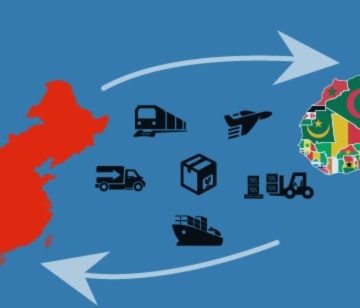The receding global soft power appeal of the United States of America has precipitated a new struggle for critical minerals, resources and markets, mostly by a host of other increasingly assertive powers. Being the world‘s seventh-largest country in size, fourth largest economy, and the most populous country, India is poised to assume a key role in the geostrategic competition for influence. This struggle is especially concentrated on countries, which can serve as a bridge-builder for enhanced cooperation with a region, such as Kenya. While this dynamic is mirrored by India’s self-perception and efforts in Kenya, a survey conducted by the HORN institute indicates a significant deviation with the perception of India among Kenya’s political experts.
India’s Ambition
According to the World Bank, India is the third largest exporter to Kenya with a trade volume of 2,121 million USD, accounting for 10.05 percent of Kenya’s imports and only behind the People’s Republic of China (18.20 percent) and the United Arab Emirates (16.38 percent). The African continent in general has emerged as one of the largest trading partner of India, which imports among others crude oil, metals and agricultural products and exports textiles, pharmaceuticals and machinery, making Africa crucial for the future growth of the Indian economy. Consequently, the strengthening of economic ties to key strategic partners has been a cornerstone of India’s strategy in Africa, in order to gain access to regional markets and opportunities. Additionally, India pursues the improvement of maritime security to protect the trade routes to Europe and Africa, the enhancement of India’s global status and the containment of Chinese influence. These efforts position India in its self-perception as a key player in geostrategic competition and as an advocate for the affairs of the Global South.
The Perception of India in Kenya
A survey, conducted in Kenya between April 17th 2025 and June 09th 2025 using the platform SoSci Survey questions this self-perception by indicating a discrepancy between India’s ambitions and the perceived reality on the ground. As the majority of the 75 participants can be identified as educated and experienced professionals in an area related to foreign affairs and development cooperation, their perception provides insight into the current dynamics. The expressed deviation is twofold, with the first significance being the inability of participants to identify India’s position, when being requested to order foreign actors according to the perceived degree of past engagement in Kenya. While 77 percent, 80 percent and 84 percent were able to position the U.S., the EU and China, respectively, only 56 percent could do so with India, although these actors have, per data, a similar large economic engagement in Kenya, which indicates a variation between the perception of these actors among the participants.
Instead, the results position India rather closely to Qatar (55 percent), the Russian Federation (53 percent) and Saudi Arabia (56 percent), but which are only accounting for 0.44 percent, 1.48 percent and 4.91 percent of Kenya’s imports, respectively. This deviation is exacerbated by a higher percentage of participants being able to locate countries like France (65 percent), Germany (67 percent) and the United Kingdom (73 percent), but whos import proportion lies with 0.86 percent, 1.38 percent and 1.37 percent significantly lower than India’s. The respondents also reported that the latter were bigger cooperation partners of Kenya than India, although indicated otherwise by the World Bank data.
This dynamic is continued in regards to the preferred future cooperation partners. Conversely to the Indian self-perception, only 8 percent of the participants identify India among the three largest partners, and rather perceive other African States (59 percent), China (37.3 percent) and the EU (32 percent) as such. This positions India just before the preference for the Russian Federation (5.3 percent), the United Kingdom (5.3 percent) and the United Arab Emirates (4 percent), despite significant different approaches in economic and other cooperations. Additionally, only 47 percent of the participants could position India in this rating, behind China (61 percent), the EU (59 percent), Germany (51 percent) and the United Arab Emirates (48 percent), which underlines a significant discrepancy between the Indian self- and alien-perception.
Behind the data
As fewer participants were able to locate India in the respective rankings than equally engaged actors, this deviation can be traced back to the perception of India in Kenya. This situation is rooted in the inability of India to offer unique services, such as China‘s Belt and Road Initiative, which would make Indias engagement striking and especially beneficial for its partners. Such an initiative would also serve India‘s ambition to enhance its global stance by gaining access to strategic markets and resources and substantiating this image among local public, as India’s current engagement remains large invisible to them. Additionally, India accounts only for 0.93 percent of Kenya’s total export, a sum of 68.345 thousand USD, which marks a trade deficit of roughly 2 million USD. Consequently, the Indian engagement is perceived as one-sided and not mutually beneficial.
Therefore, India should re-evaluate its partnership with strategic partners, and Africa in general, and align its ambitions with its foreign actions by finding shared interests, such as cooperation in the health and AI sector, and by improving its communication. Such a change of behavior should also be mirrored on the diplomatic level, as the Indian government is generally acting cautious and slowly regarding its engagement in foreign countries, which adds to the lack of visibility of India and its engagement in the conducted survey. A notable example for this is the absence of the fourth India-Africa summit, with the last summit being held in 2015, although of an increasing necessity due to changes in the global landscape. Considering the summits and their outcomes between Africa and other actors, such as Türkiye, China, Russia or the EU, this missing out substantiates the deviation between India’s ambition and reality their quest for influence.
Jakob Dehner is a Research Intern at the Horn Institute
Photo Credits: OPRK.



